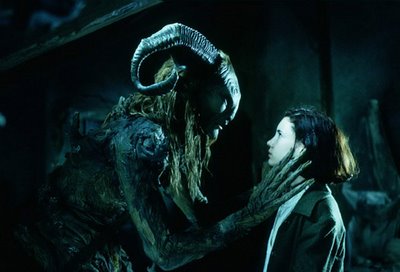Pan's Labyrinth

This week's Netflix movie came - The Tommyknockers, a tv miniseries based on a Steven King novel and starring Jimmy Snits and Marg Helgenberger - but don't worry, I'm not going to inflict the review of it on you :-). I thought instead I'd write a little about another movie, the review of which I read today at Roger Ebert's site ... Pan's Labyrinth.
The 2006 film (in Spanish with subtitles) is directed by Guillermo del Toro, who was influenced by a number of other works in its creation, including Jorge Luis Borges' Labyrinths and Lord Dunsany's The Blessing of Pan. The story is set in Spain in 1944, after the Civil War, and tells two intertwined tales ... one about a young girl who travels with her pregnant mother to meet her stepfather, an army captain, at a stronghold in the mountains, where he's posted to eradicate lingering rebels ... and another about a long lost fairy princess.
Below is part of the review by Jim Emerson. Read the whole thing at Ebert's site, here.

*****************************************
Guillermo del Toro's "Pan's Labyrinth" is one of the cinema's great fantasies, rich with darkness and wonder. It's a fairy tale of such potency and awesome beauty that it reconnects the adult imagination to the primal thrill and horror of the stories that held us spellbound as children. If you recall the chills that ran down your spine and the surreal humor that tickled your brain in the presence of "Alice in Wonderland," "Little Red Riding Hood" or "The Wizard of Oz" when you were a child (or, later, in the nightmarish dream-films of Luis Bunuel, Jean Cocteau, F.W. Murnau or David Cronenberg), you'll discover those sensations once again, buried deep in the heart of "Pan's Labyrinth." ....
Opening titles set the story in Spain, 1944, as resistance fighters lurking in the mountains continue to fight Franco's fascist regime. And then, immediately, before we can grasp any visual bearings in that world, the subterranean voice of Pan (a faun, whose name "only the wind and the trees can pronounce") whisks us into a fable about a dead princess whose kingly father waits for his daughter's soul to return in another form, and to reclaim her place at his side.
In the first vertigo-inducing minute or so of the film we're plunged into the turbulent imagination of Ofelia (Ivana Baquero), a bookish 11-year-old girl who is traveling with her pregnant mother Carmen (Ariadna Gil) to an old mill in the forest, where Ofelia's evil-stepfather-to-be, Capitan Vidal (Sergi Lopez), commands a fascist outpost. Next door is an ancient stone labyrinth, a place that's easy to get lost in.
he night of their arrival, Ofelia clings to her mother in bed as the creaky old house moans and Ofelia's unborn brother restlessly kicks. Carmen asks her daughter to tell the baby a story, to calm his nerves (as well as Ofelia's). The girl rests her head on her mother's belly and the camera, positioned at the foot of the bed, descends into Carmen's womb, where we see the fetus suspended in warmly glowing amniotic fluid.
Ofelia tells of a rare and beautiful night-blooming blue rose that once grew on a mountaintop .... The camera moves to the right and there's the rose and the mountain. Then it descends into the prickly brambles where a mantislike insect (previously encountered by Ofelia in the woods) alights in the foreground. The bug takes wing and the camera soars to keep up with it, past the moon and onto the stone sill of the room where Ofelia and her mother lie in bed. This astounding and fluid composite shot serves as a microcosm of the whole movie: a graceful, complex but seamless, seemingly inexorable movement that weaves in and out of fantasy and reality so that each becomes an extension of the other ....
Ofelia's challenges do not arise like arbitrary plot obstacles; they are organic to her (and the movie's) development. The girl learns not only to follow instructions, and that there are heavy prices to pay for failing to abide by them, but also to trust her own instincts about right and wrong. In order to find her true self, she must also find the strength to break the rules imposed by authority.
An individual conscience: What could be a more powerful anti-fascist weapon than that?
***************************************



2 Comments:
Happy New Year, Crystal!I hope I get a chance to see this film. I saw the trailer and it looks great. I'm a big fan of Sergi Lopez as well.
Hi stranger - Happy New Year :-)
Post a Comment
<< Home